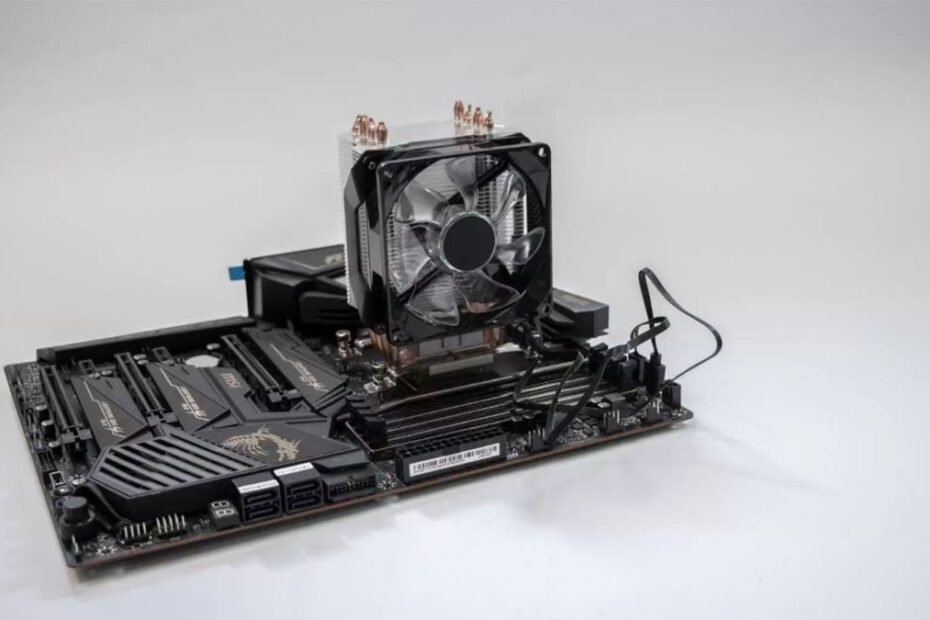It used to be that building your PC with the help of sites like PC Part Picker could save you money over buying the best gaming PC you could afford off the shelf, especially since the prices of some components, such as the best graphics cards, have seen some incredible markups in recent years.
And, as someone who has been banging the drum for lower-cost PC components in almost every review I’ve done, you’d think Amazon’s entry into the PC component market with its Amazon Basics CPU Air Cooler would be cause for celebration. After all, it’s cheap, coming in at just under $30, which is ideal for a low-budget build.
Still, I can’t think of another company I’d rather have in the PC component market than Amazon, and this venture into PC building does not bode well for PC builders everywhere.
Although it is inexpensive, it is still a knock-off
According to Tom’s Hardware, this Amazon Basics CPU Cooling Fan looks almost identical to this Cooler Master Hyper H410R RGB CPU Air Cooler, which costs nearly three times as much as the Amazon Basics CPU cooler.
The specs are almost comically similar, as if Amazon simply copied Cooler Master’s CPU cooler design, slapped on a 20% slower RGB fan, and ruthlessly undercut the company that did all the work to engineer the CPU cooler in the first place.
Don’t get me wrong: I’m not here to cry for the profits of a component manufacturer that makes a lot of money selling computer parts. But, whatever else we can say about Cooler Master, it at least has a vested interest in the market it’s catering to, whereas Amazon is only interested in making a quick buck and isn’t interested in the market beyond the money it can extract from it.
Whether you like it or not, Cooler Master did the work to engineer the fan that Amazon just ripped off, and Cooler Master presumably invested money to ensure it does the job it claims to do. I almost guarantee that Amazon hasn’t done anything like that.
Amazon has seen from its own internal sales data that a product is selling well on its site, so it went ahead and made a knock-off version of it and is now selling it alongside the product it copied at a much lower price. This isn’t the first time Amazon has done something like this, and it won’t be the last.
If this trend continues and Amazon aggressively moves into PC components as it has with home goods and elsewhere, PC builders will suffer in the long run.
Why are knock-offs bad in the long run?
The issue with knock-offs is that the people who make them don’t know what they’re doing. They haven’t created an original idea or product; they’ve simply copied what someone else has done successfully after a lot of time and investment.
The more people who buy knock-offs, however, the more the original manufacturers’ bottom lines suffer. Again, I’m not here to lament Cooler Master’s lost revenue, but I do care about Cooler Master continuing to produce a quality product, which, like it or not, costs money. Amazon will never invest money in developing a high-quality CPU cooler.
If everyone buys Amazon’s knock-off cooler, Cooler Master has less incentive to build a better one, since Amazon will just copy it and everyone will buy that one instead. So, what exactly is the point?
As there is less incentive to invest in proper engineering, the quality of all CPU coolers will deteriorate over time, and we will end up with worse products because everyone is now forced to scrape the bottom of the revenue barrel. After all, Amazon is out here selling knockoffs.
Sure, that build now costs less to construct, but future builds will have a hard-quality ceiling as a result.
Budget products must be taken seriously by component manufacturers
In the end, Amazon is doing what it is doing because there is a market for low-cost PC components. Even without considering AIO, the best CPU coolers can be quite expensive, so it stands to reason that Amazon would try to capitalize on this market gap.
The solution is for component manufacturers to fill those gaps with high-quality, low-cost offerings. Component prices have been steadily rising year after year, putting budget PC builders in a difficult position. It was unavoidable that someone would step in to fill that void, and it’s a shame that it’s Amazon, but that was entirely predictable.
Unless component manufacturers want to be completely fleeced by Amazon undercutting them with knock-offs, they must provide customers with an alternative that Amazon cannot undercut. Let’s hope they hear the industry’s wake-up call.
